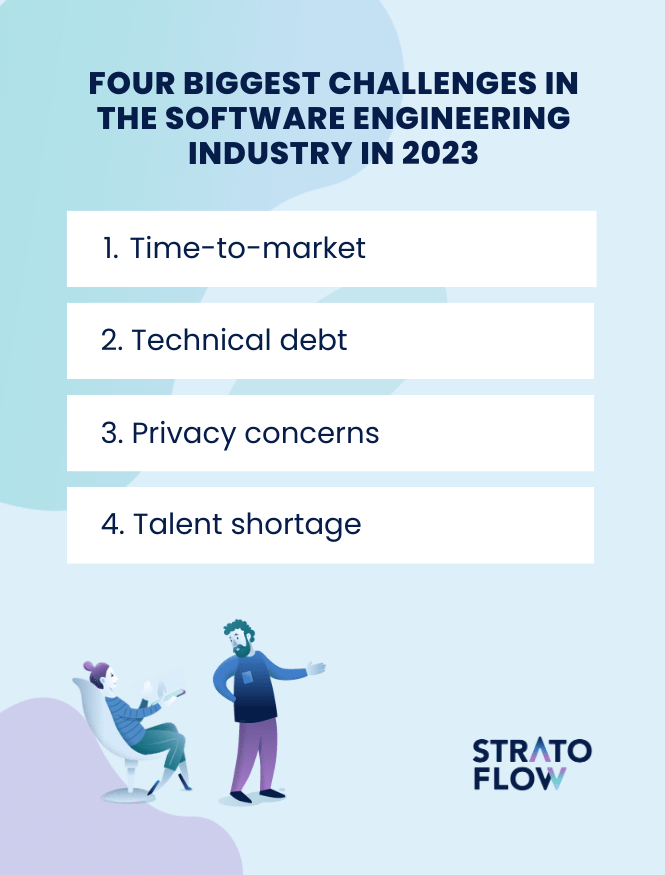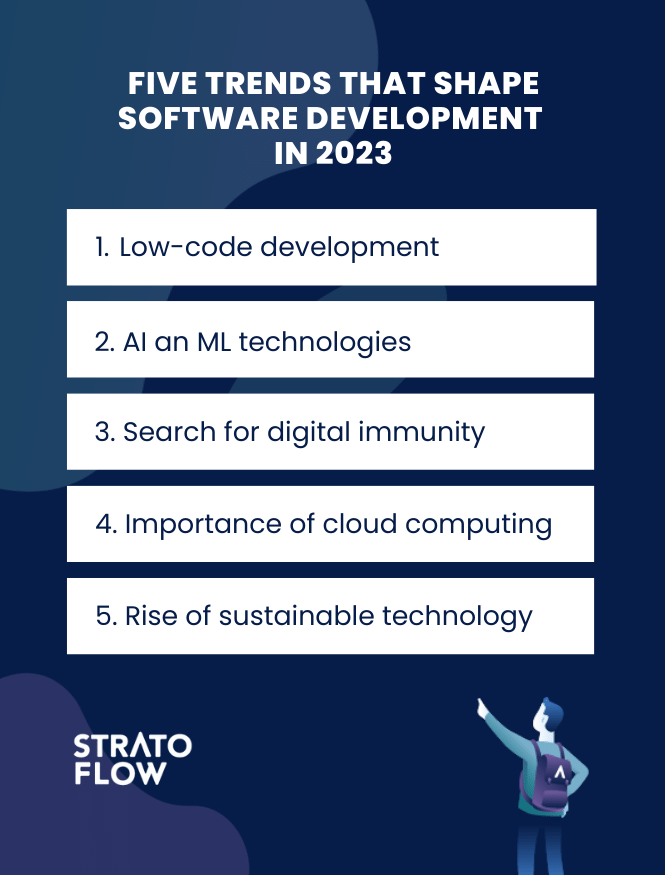
The Future of Software Engineering: Key Emerging Trends in 2024
Software engineering is a rapidly evolving field, with new trends and technologies emerging at a remarkable pace.
In this article, we will explore the key emerging trends that are shaping the future of software engineering.
From artificial intelligence and machine learning to low-code programming methodologies, we will take a closer look at how these technologies are changing the software engineering landscape and what the implications are for the future of the industry. Keep reading!
Contents
- What is software engineering?
- What is the future of the software engineering industry?
- The past present and future of standards in software engineering
- Current challenges in the software engineering industry
- Five trends that shape software development in 2024
- Demand for skilled software engineers
- Will software engineers be needed in 2030?
- Will AI replace software developers?
What is software engineering?
Software engineering is the implementation of fundamental engineering principles in the design, development, testing, and maintenance of software products. Its primary goal is to develop software systems that are high-performance, efficient, reliable, and easy to maintain.
Software engineering involves a systematic and structured approach to software development that includes requirements analysis, design, coding, testing, and maintenance. It also involves the use of various software development methodologies and tools (tech stack) to ensure that the software is developed in a timely and cost-effective manner while meeting the requirements and needs of the users.
Software engineering is essential for organizations in virtually every industry, as software plays an increasingly important role in our daily lives. It is used in a wide range of applications, from simple mobile applications to complex enterprise software. As such, software engineers are always in demand and play a critical role in the development of new technologies for the advancement of society as a whole.

What is the future of the software engineering industry?
The future of software engineering is hard to predict. One thing is certain: it will be characterized by continued growth, innovation, and evolution.
As software systems become more specialized and tailored to specific industries, there will be an increasing need for industry-specific standards to ensure quality, reliability, and compliance. In addition, as new technologies emerge, software solutions will become more powerful and capable of meeting increasing user expectations.
Overall, the software engineering industry is expected to continue to grow and evolve in response to the changing needs of businesses and users.
The past present and future of standards in software engineering
Software engineering has always had a set of standards, guidelines, and best practices aimed at ensuring the quality, reliability, and maintainability of software systems. However, just as the IT market is constantly changing, so too are the standards and best practices. Here is an overview of past, present, and future software engineering standards:
Past programming standards
The early days of modern software engineering projects saw the rise of the first software development methodologies – a set of rules and practices that aimed to make the process of creating software products more streamlined.
- Waterfall model – The waterfall model was the dominant software development methodology in the 1980s and early 1990s. It was a linear approach that emphasized planning, requirements gathering, and documentation.
- Capability Maturity Model (CMM) – The CMM was also introduced in the late 1980s and provided a framework for assessing the maturity of software development processes in organizations.
- Rational Unified Process (RUP) – an iterative software development process framework created by the Rational Software Corporation, which was acquired by IBM in 2003. RUP provides a disciplined approach to assigning tasks and responsibilities within a development organization, with the aim of ensuring high-quality software that meets user needs.
Present software development standards
Today, software engineering methodologies have matured to the point that development teams can focus on other, supportive activities surrounding coding itself such as cybersecurity, and an iterative approach.
- Agile methodologies – Agile methodologies, such as Scrum and Kanban, are widely used today and emphasize iterative development, collaboration, and flexibility in the software development process.
- Continuous Delivery – Continuous Delivery is an approach that emphasizes delivering software in small, frequent increments. It is expected to become increasingly popular as organizations seek to improve their agility and responsiveness.
- DevOps – DevOps is a set of practices that aim to improve collaboration between software development and operations teams to increase efficiency and quality.
Future of software engineering
In the coming years, software engineering standards will continue to evolve and create practices more catered to specific industries, aimed at improving the time-to-market for digital applications. Software development companies will also have to figure out what role AI will play in their methodologies and products, especially from an ethical standpoint.
- AI Ethical Standards – As AI and machine learning become more prevalent in software development, ethical standards will be needed to ensure that these technologies are developed and used responsibly.
- Energy Efficient Computing – Climate-friendly programming languages, data processing models and energy-efficient hardware will become more popular due to raising climate awareness and always increasing energy costs.
- Industry-Specific Standards – As software systems become more specialized and tailored to specific industries, there will be an increasing need for industry-specific standards to ensure quality, reliability, and compliance.
[Readm more: Can ChatGPT Write Code?]

Current challenges in the software engineering industry
Even though the software development industry is constantly evolving and improving, that doesn’t mean it’s free of problems and inefficiencies. Here are 4 key challenges that the software engineering industry is currently struggling with:

1. Time-to-market
Time to market in software development refers to the time it takes to develop and release a software product. It is literally the time it takes from the initial idea or concept to the final product being available for purchase or use by customers.
In today’s fast-paced economy, time-to-market is more important than ever because it can directly impact the success of the product and the competitiveness of the organization, especially in the startup phase. As digital trends come and go, it often comes down to which company releases a demo of their product first, which determines their success in the digital marketplace.
2.Technical debt
Technical debt is the sum of the additional work required to maintain and update software applications or systems due to the use of suboptimal or inefficient application development practices and initial architectural designs. It is similar to financial debt in that it accrues interest over time and can become a significant burden on software development organizations if left unaddressed.
If a software development company takes shortcuts, such as neglecting performance testing or not considering long-term scalability, just to release the application on time, these shortcuts will undoubtedly create technical debt. Technical debt is one of the main culprits making legacy software systems so infuriating to work with.
As the app gains popularity and users, the company may realize that certain features need to be added as soon as possible. However, because of the technical debt, it may be very difficult and time-consuming to make these necessary changes. The code may be difficult to understand or modify, or there may be compatibility or scalability issues. All of this greatly hinders the adaptability and flexibility of technology companies.
3. Privacy concerns
The sheer volume of private user information collected by companies across industries is staggering. With the growth of digital technology and the widespread use of smartphones, laptops, and other Internet-connected devices, this vast amount of personal data is being used by companies to personalize content and product offerings with one main goal in mind: maximizing their revenue.
But there’s another side to this coin – all this highly sensitive information makes users much less trusting of organizations that operate online. On top of that, privacy concerns are being exacerbated by US and EU regulations. All of this requires extra effort on the part of software developers to address all possible privacy concerns.
4. Talent shortage
The talent shortage is currently considered a major problem in today’s software development market due to the high demand for skilled software developers and the limited supply of qualified candidates. Don’t get us wrong. There are plenty of junior and mid-level developers out there, but it is the highly experienced senior developers that software companies are really looking for.
With the rapid pace of technological advancement and the increasing reliance on software in various industries, the demand for software development skills has grown significantly in recent years. However, the supply of skilled software developers has not kept pace with this demand, resulting in a talent shortage.
[Read also: Introduction to IT staff augmentation]
Five trends that shape software development in 2024
Let’s now move on to the technologies that will shape the next decade of advancements in software engineering. Here are the five most influential software development trends:

1. Low-code development opens new opportunities
One of the most important software engineering trends in 2024 is low-code development.
And I know what you are thinking.
Using a low-code development platform (LCDP) is a direct path to generating technical debt, losing data ownership, and falling into a vendor lock-in scenario.
Your concerns may be somewhat justified, but there’s another alternative in the form of open-source low-code solutions. These platforms let developers build scalable, extensible, and secure SaaS applications faster and more efficiently. All while retaining full code ownership.
According to recent research from Gartner, the worldwide market for no-code and low-code technologies is expected to reach $26.9 billion by the end of this year. This estimate represents an increase of nearly 20% and 19.6% by 2022, far outpacing the traditional software development market.
2. AI technologies are changing the game
This entry on the list was rather obvious.
Apps that use artificial intelligence solutions like ChatGPT and DALLE-2 are considered by the media to be the dawn of the AI revolution. And this may very well be true. After all, large multimodal natural language processing engines can be used in virtually every aspect of modern business, and that includes software engineering.
Even now, ChatGPT can create a complete HTML front-end code for a website form a sketch on a napkin or a simple Snake game based on a single prompt. Keep in mind that these stunts were performed on GPT 3. GPT-5, which is set to be released by the end of this year, is said to have up to 100 times more parameters than the previous generation, making it one of the largest neural networks ever created with an estimated 17.5 trillion parameters and with 1.26 zettaflops of computing power under its hood.
What will this mean for software developers? It is tough to predict exactly. One thing is for sure – an experienced software engineer will still be indispensable for organizations that create custom software. However, their day-to-day work could be greatly accelerated by the use of these advanced AI capabilities.
3. Greater resilience with digital immunity
As the risk of cybercrime continues to grow, it is increasingly important to continuously develop new methods to protect both systems and their users.
Cyber threats not only put sensitive user information at risk, but also something arguably more important from a business perspective – a company’s reputation. As a result, organizations are actively seeking innovative ways to become more digitally resilient, as evidenced by the latest software development trends.
To achieve complete cyber immunity, many companies are adopting a holistic approach to cybersecurity that integrates and streamlines various techniques such as observability, automated testing, chaos engineering, site reliability improvements, and software supply chain security, combined in a so-called DevSecOps approach. By using these techniques, companies aim to improve the durability of software products, services, and systems, thereby reducing the potential risks associated with cybercrime.
4. Cloud Computing will transform into Hybrid Computing
Although cloud services have been around for some time, they have now become a viable option for businesses in a variety of industries. Companies like Amazon, Microsoft, Netflix, Facebook, General Electric, and eBay have fully embraced cloud-based technology for most aspects of their business, inspiring others to do the same.
There are numerous benefits associated with moving to the cloud, including significant cost savings, improved security, and greater scalability. In addition, many cloud-based services offer cloud analytics, an essential tool for those who rely on data-driven decision-making.
However, due to both the greater costs of cloud computing when compared with on-premise infrastructure and the raising data privacy concerns the trend of moving key computing workloads from external clouds to on-premise installations already started, see the stories from Basecamp and Ahrefs.
Future of software engineering – forecasts and statistics
- According to a report by Data Bridge Market Research, the global software engineering market size was valued at USD 47.3 billion in 2022 and is expected to reach USD 89.3 billion by 2030, growing at a CAGR of 11.8%. The report also segmented the market by type, application, and region.
- According to a report by Statista, the average annual salary of software developers worldwide as of 2024 was USD 86,000, with the highest salaries in Switzerland (USD 90,000), Germany (USD 88,000), and the United States (USD 86,000).
- According to Forbes The AI market size is expected to reach $407 billion by 2027, experiencing substantial growth from its estimated $86.9 billion revenue in 2022.
- The average number of AI capabilities that organizations use, such as natural-language generation and computer vision, has also doubled—from 1.9 in 2018 to 3.8 in 2024.
- Going forward, 63 percent of respondents say they expect their organizations’ investment in AI to increase over the next three years.
Demand for skilled software engineers
There’s been a lot of media attention lately about layoffs in the tech industry. Companies like Meta, Twitter, and Amazon have laid off thousands of their skilled developers due to the general market slowdown.
How did that influence the demand for skilled software developers?
Well, according to the U.S. Bureau of Labor Statistics (BLS), employment of software engineers with a background in computer science in the states is projected to decline 10 percent from 2021 to 2031. It is mostly due to the rising popularity of outsourcing of software development and new methodologies, greatly improving the pace of programming projects. Find out more about Nearshore Software Development.
Despite declining employment, around 9,600 new openings for programmers are projected to appear each year, over the coming decade. All of those openings are expected to result from the need to replace workers who transfer to other occupations, and greatly increased demand for IT services.
It is also worth mentioning that a decline in one aspect of the tech market doesn’t indicate a decline in all of them. Jobs as a Robotics Engineer, Site Reliability Engineer, or Data Engineer are all predicted to see a 30 to 40% increase in demand by the end of this decade.
There’s also a visible difference in demand for certain programming languages. According to the TIOBE Programming language popularity index, the top three programming languages are unchangeable Python, Java, and C. If you are looking to start a career as a software developer, these languages will always be a safe bet as the demand for skilled professionals will always be there.
[Learn more about The Most Efficient and Environment Friendly Programming Languages]

Will software engineers be needed in 2030?
In the previous paragraph, we mentioned that recent data suggests that the demand for software developers will decline in certain areas, especially in the US.
If this trend continues, will software engineers still be needed by the end of this decade?
Well, almost certainly.
The continued expansion of technology, the Internet of Things (IoT), cloud computing, and cybersecurity, among others, will drive the need for software engineers to design, develop, implement, and maintain the software systems that enable and support these technologies.
In addition, the COVID-19 pandemic has accelerated the digital transformation of many industries, increasing the demand for software engineers in various sectors, including healthcare, finance, education, and e-commerce.
Of course, the future of software engineering is not set in stone, and the software development market is constantly evolving. Who knows when modern and popular programming approaches like microservices and microkernel architectures will be replaced by more efficient and innovative alternatives? Regardless, as long as software engineers stay abreast of the latest trends and technologies and develop their skills accordingly, they will continue to be invaluable to tech companies.
But we also have to address the elephant in the room: the AI.
We’ve already mentioned the impressive capabilities of ChatGPT in regard to programming. So let’s now assess the risk of artificial intelligence taking away our jobs.

Will AI replace software developers?
Short answer: no!
Long answer: also no, but it will certainly cause significant changes that we need to prepare for.
While AI can be used to automate certain aspects of software development, such as testing and code generation, it cannot replace the creativity and critical thinking skills required for software development. Software engineers are responsible for designing, implementing, and maintaining complex software systems according to customer requirements, which requires human intuition, problem-solving, and decision-making skills that are difficult to replicate by AI.
One thing is for sure, aspiring software engineers will find it harder to break into the IT market in the future, as many of the simpler and more repetitive tasks can be automated by AI.
[Read also: How to find software developers]

The future of software development – closing thoughts
The software development industry is constantly changing and evolving. New technologies, tools, and methodologies come and go as organizations strive to build more efficient, faster, and better software solutions than ever before.
As software development continues to evolve, it is important to remember that the human touch remains essential. By embracing new technologies and approaches while maintaining a focus on human ingenuity, the future of software development looks bright.
Related Posts
- How to Build an Inventory Management System: Key Steps and Tips
- How to Build a Document Management System: Alternative Approach
- Online Shopping Recommendations – Introducing Them to Your Business
- Amazon Product Recommendation System: How Does Amazon Algorithm Work?
- Movie Recommendation Systems: A Business Guide
Thank you for taking the time to read our blog post!
